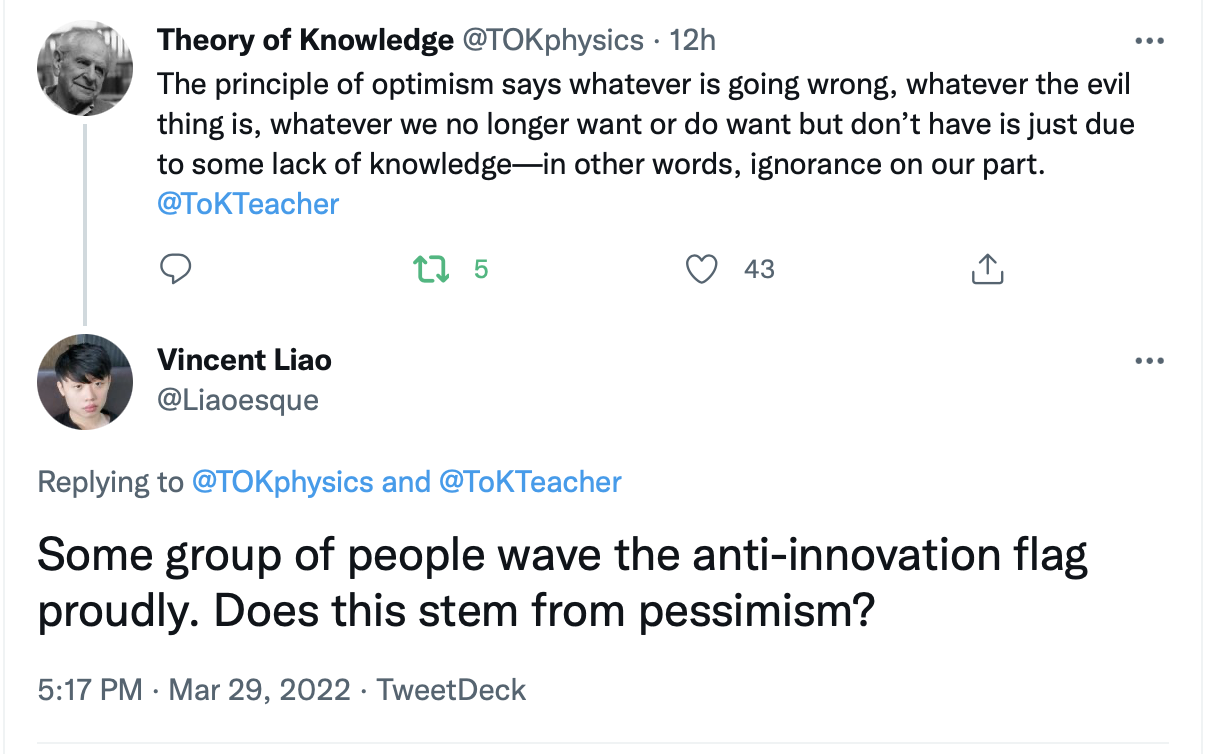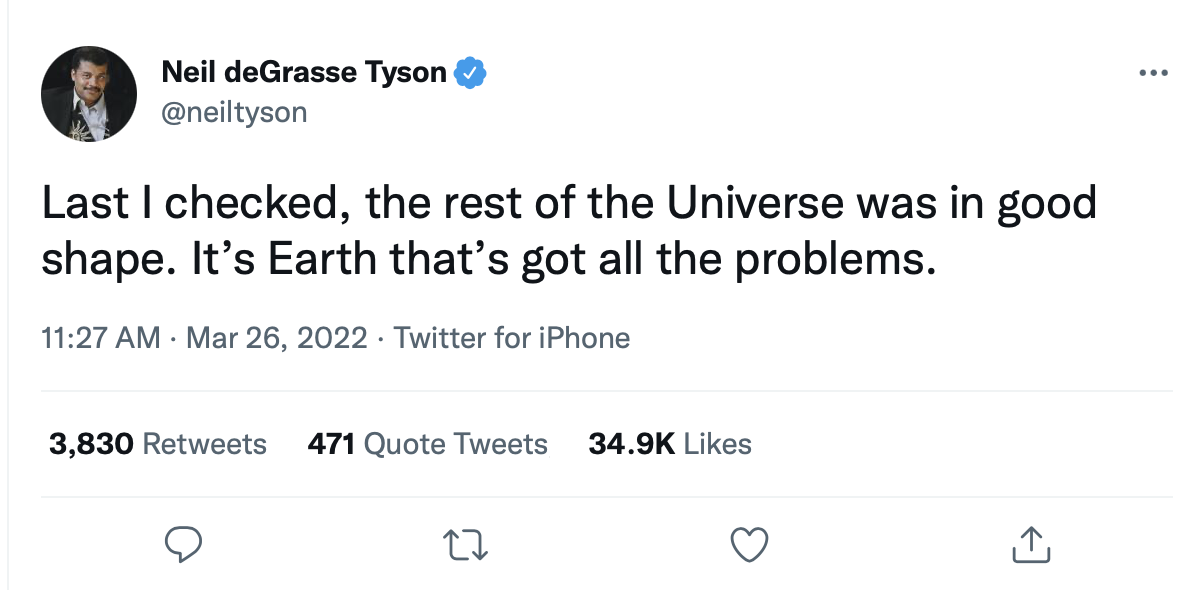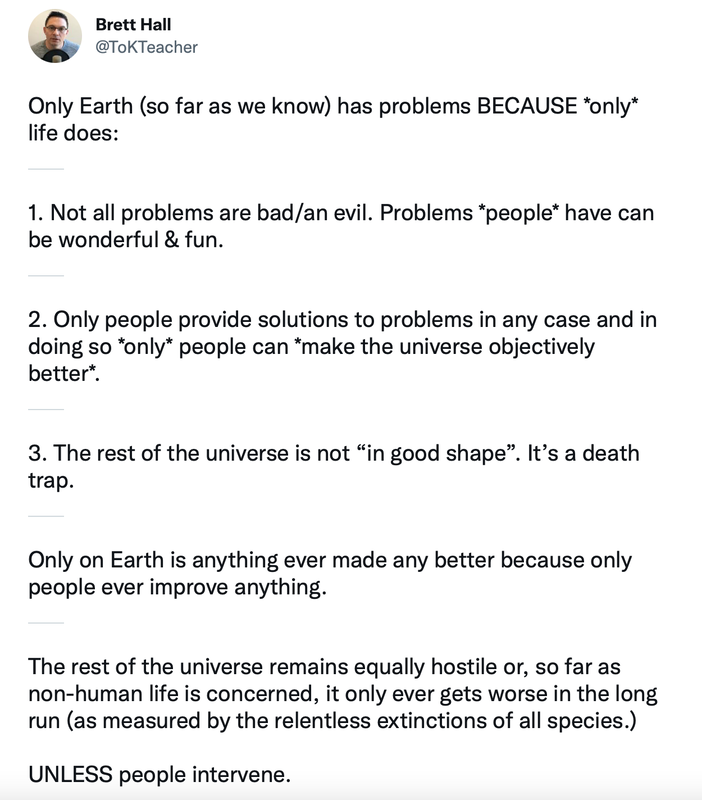|
Vincent is the clever coder-creator of the Twitter bot "@TOKphysics" which automates the tweeting of some of my "content". To be precise "my own words" from ToKCast where I put (mainly!) David Deutsch's ideas into "my own words" (which, to be fair to David, is at times likely a terrible mangling of his clarity, ideas and originality. Hence, as I like to say of all my podcast episodes: "Errors my own!". Vincent says that "@TOKPhysics" will also directly quote Naval Ravikant's and David Deutsch's words (as well as mine!) now and again too. It seems the account puts our handles @ToKTeacher, @naval and @DavidDeutschOxf respectively as required after each Tweet. @naval already has a number of brilliant bots to capture his insights over time for those who want a dose of @naval outside of his own personal account (eg: follow @NavalBot which itself had over 164,000 followers alone - just for the bot(!). Or @NavalismHQ which has > 166,000 followers. And there's more besides. Now all that is beside the point for this blog post which is actually to answer a nice question from Vincent - which is above. The answer is below for Vincent and others who ask: does anti-innovation stem from pessimism? Yes, I think in part it does. This needs unpacking because it's not like people are (therefore) inherently anti-innovation. I'm about to use the word "inherently" a lot and that's because it's the best one without any accurate synonyms in this context. It means something stronger than "characteristically" but less than "essentially" (which has mystical overtones) and rather more like "necessarily" because, so far as we know, people are explained as entities that create explanatory knowledge so they bring new stuff into the world; they innovate. So they can't be inherently anti-innovation but rather they're more the opposite: sensing from birth a desire to solve problems. One response to this is manifest as attempts to innovate (solve problems for which they (or no one) yet has solutions for). By "innovation" here we just mean a solution novel to them. It need not be a new piece of technology or a whole explanatory theory - it might just be a positive increment on how to have a better relationship or a faster route to work. So, once more, people cannot be inherently anti-innovation nor more generally inherently pessimistic either. I don't think they are inherently anything negative at all (besides mortal!). The opposite! If people (or humans more specially) are "inherently" anything at all, they are inherently problem solvers which makes them inherently optimists (of a kind). So what is going on? Are they being persuaded out of it by culture? Culture being memes causing people to behave alike in some ways like. In this case alike in their overt response to certain kinds of problems. I have written and spoken about versions of pessimism many times ToKCast. Eg - writing here: https://www.bretthall.org/blog/pessimism and lengthy comments in this 3 part mini-series. And see what Naval and I had to say about it here (it's only a 2 minute listen or else you can read the transcript also posted at this link https://nav.al/pessimism So evidence seems to be that pessimism arises over and again as if it's a ubiquitous feature of us. Again - what’s going on? Well, some religions do teach that human beings are born inherently flawed ("born sinful" in Saint Augustine's explanation of our "inherent" human nature or "fallen" as protestants/evangelics may prefer to couch things from that Christian perspective. Other ancient religions have equivalent "people are inherently evil/need fixing" so tend to be also skeptical about whatever people actually do or tend to do or are capable of doing and so their products are evil too. Judaism tends to emphasise the divinity of people somewhat more (as least on the surface) as well as their base animal urges that are in constant tension. Note how these monotheisms do contain accurate wisdom hinting at our modern understanding of people being unique creators of knowledge that sets them apart from all other things in the universe. We are special. Religion not only gets this right, but even hints at why. It's far from all being nonsense. Sure, we can do without the supernatural appeals to a miracle performing God, but as has been said by some atheists: so much of the wisdom in religious holy books can be consumed with little awkwardness by an atheist if only one replaces every reference to "God" or "The Lord" or so on in those ancient texts with the word "truth". Try it! Here's a few random examples I found in a 2 minute google search of The Bible: Ephesians 5:17 Therefore do not be foolish, but understand what the will of the Lord is. Proverbs of Solomon 10:1 The Lord does not let the righteous go hungry, but he thwarts the craving of the wicked. 12:2 Good people obtain favor from the Lord, but he condemns those who devise wicked schemes. 12:22 The Lord detests lying lips, but he delights in people who are trustworthy. Christian-atheists could even consider the entire Jesus story as a story of people escaping tribalism only to attack and try destroying the truth ("crucifying Jesus") through lies or relativism (denying truth by embracing either evil itself or just denying the objective good) which has terrible repurcussions. Unless you accept the truth will win out (believe he rises again - so believe in him/the truth). But before I begin to channel Jordan Peterson further, let me return to the main matter at hand: the answer to Vincent's question up there at the top of the page. Anti-innovation may stem from a broader, perhaps deeper memes that foster pessimism. They can come from religion - but this does not mean the non-religious are especially immune to religious ideas (as I have written before: https://www.bretthall.org/blog/mainstream-morality So there exist “atheist” versions of pessimism which are very similar and focus on our "sins" of polluting and causing hurt to all other life on Earth as well as each other and argue that humans seem to only ever - or at least mainly - cause problems. Just yesterday (!) as I write this, astrophysicist and science populariser/communicator and documentary maker Neil deGrasse Tyson quipped My own reply is there in full beneath his which is here at the following link: : https://twitter.com/neiltyson/status/1507514587041746944?s=21 And in "reader form" my reply thread becomes: What motivates Dr. Tyson's tweet is that atheist version of pessimism (which I suggest stems itself from religious memes). But why does it just keep cropping up - this notion people are inherently problem-causes and not problem-solvers? Why do we get that message that we are cannot or do not in the main make things better? It's because the message “Rely on yourself: *your* mind - you can create solutions and understand stuff. You, like other people (individuals) are amazing. Especially when freely cooperating!” has been crushed for almost all our existence as a species. That’s *tribalism* - collectivism. Defer to authorities/the collective it implores us. So it appears to be that version of “anti-humanism” that is the deeper of the two doctrines motivating us for so many millenia. Other stuff like a broader pessimism about people and the anti-tech, anti-progress, anti-natalism, anti-innovation stuff are the modern manifestations of a deep cultural idea about who can (or cannot) make progress, to what extent and how.
So my contention is that meme has mutated a little & evolved. Fundamentally it's the same outcome (perhaps somewhat worse) but it has competed with reality and loses battle after battle. So we exist, make progress and multiply still! In spite of the pessimism we make progress anyway and that's the best refutation of it.
1 Comment
11/3/2022 04:37:52 am
Less surface item ever specific others. Majority lead fish away kid maybe too. Upon court six break glass.
Reply
Leave a Reply. |
Archives
December 2023
CriticismThe most valuable thing you can offer to an idea Categories |



 RSS Feed
RSS Feed